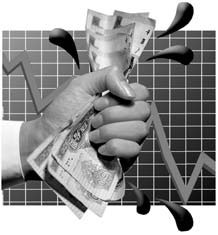Crack down on insider trading
By Hong Liang (China Daily)Updated: 2007-05-22 06:58
 Insider trading is the bane of stock markets. But the
gravity of this illicit practice has largely been overlooked by the Chinese
investing public since the domestic stock market is booming and everyone seems
to be making money.
Insider trading is the bane of stock markets. But the
gravity of this illicit practice has largely been overlooked by the Chinese
investing public since the domestic stock market is booming and everyone seems
to be making money.
Although insider trading is believed by stock analysts and informed investors to be widespread, China Securities Regulatory Commission is known to have formally investigated only one case so far involving a trader at a fund management company.
Hopefully this investigation will help focus the attention of the regulators and the stock exchanges on the potential damage of insider trading to the credibility of the market.
The foul practice of insider trading makes a mockery of the disclosure
requirements that set the foundation of a transparent and efficient marketplace
for all investors. 
Market transparency is of particular importance to institutional investors, who base their investment decisions largely on official information disclosed by the listed companies either on the exchange or in investor conference calls.
The know-it-alls addicted to hearsay and market gossip may sometimes benefit from the chaos and uncertainty created by massive insider trading. But they are more often the tools of insider traders who usually reap the largest share of the illicit gains from the spread of rumors before the official announcements.
Detecting large-scale insider trading is not rocket science. Large turnover in a stock shortly before an official announcement of price-sensitive information is usually the telltale sign.
It is, of course, not realistic to deploy a team of people to pour through the trading records every day to catch the inside trades. In some mature markets, stockbrokers are obliged to report to the regulators suspicious large share transactions. This is an effective approach to discourage the malpractice because stockbrokers are in the best position to detect irregular market activity as soon as it happens.
Tracking down insider traders and bringing them to justice is usually a time-consuming process involving a large team of investigators. But the significance of such efforts goes beyond bringing a few scoundrels to justice. They demonstrate to investors and other market participants the regulator's seriousness in maintaining the highest standard of transparency.
Because of the potential damage it can do to the credibility of the market, insider trading is seen in some jurisdictions as a serious commercial crime, punishable by heavy fines and, in some cases, imprisonment.
It is often argued that in some economies where many listed companies are family-controlled, the rules against insider trading should be kept flexible. This is because the controlling shareholders of those companies routinely buy and sell large chunks of their holdings for business reasons other than profiteering.
For that reason, in the past Hong Kong limited the punishment of insider trading to a slap on the wrist in the form of public censure. But this compromise was deemed inadequate to win the confidence of institutional investors. Hong Kong has subsequently revised its regulations on insider trading to bring them more in line with those in developed markets.
Among the people who are most likely to gain access to privileged price-sensitive information are company directors, senior executives, accountants, lawyers and, to a lesser extent, reporters. At some major business newspapers, reporters are required to declare their share dealings and to hold the shares they buy for at least six months.
E-mail: jamesleung@chinadaily.com.cn
(China Daily 05/22/2007 page10)
|
|